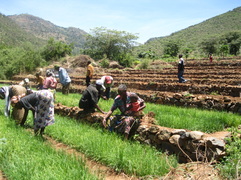Water irrigation farming

Working in the field together
In the western
lowlands of Same District several modell farms benefit from the combination of
fertile soil and irrigation from the nearby Pangani River. The simple idea of
channeling water streams from the river to the originally dry land and thus
enabling cultivation was realized through a cooperation. Members of
KIHO, the United Nations World Food Program, Caritas
and the local communities started to plan and conceptualize the project in
1998. Within five years the farmers had already harvested several times.
Nowadays, in the second planning and evaluation phase of the project, Kilimanjaro Hope Organization works with farmers to lay out shortterm and longterm plans. Our goal is to teach people how to make the best use of the natural resources (water and land) and how to use the existing infrastructures (irrigation channels) efficiently.
The model farms enable local farmers to increase their income and to create employment for the local community. Here KIHO follows the principle of awareness creation in the rural areas, through proving the successful utilization of appropriate methods and technologies.
The neighboring area besides the model farms, up to 20 km away from the Pangani River, offer further potentialities for cultivation. We seek to cooperate with the local communities to expand the benefiting practices of the model farms.
Nowadays, in the second planning and evaluation phase of the project, Kilimanjaro Hope Organization works with farmers to lay out shortterm and longterm plans. Our goal is to teach people how to make the best use of the natural resources (water and land) and how to use the existing infrastructures (irrigation channels) efficiently.
The model farms enable local farmers to increase their income and to create employment for the local community. Here KIHO follows the principle of awareness creation in the rural areas, through proving the successful utilization of appropriate methods and technologies.
The neighboring area besides the model farms, up to 20 km away from the Pangani River, offer further potentialities for cultivation. We seek to cooperate with the local communities to expand the benefiting practices of the model farms.
